Application of new technology in Cosmetic Dermatology
Recently, the Central Dermatology Hospital organized the 8th National Cosmetic Dermatology Conference with the theme "Updated Skin Aesthetics - Integration and Development". The event gathered more than 1,500 delegates who are medical staff , professors, doctors and experts in the field of cosmetic dermatology from domestic medical units, members of the Vietnam Dermatology Association and many international experts.
The National Cosmetic Dermatology Conference is one of the typical annual professional activities of the dermatology industry. This year, the conference has 22 scientific sessions, with more than 80 professional reports, including 12 international reports from leading cosmetic dermatologists from Italy, Japan, Poland, Taiwan (China) and Singapore.
Associate Professor, Dr. Le Huu Doanh , Director of the Central Dermatology Hospital, Head of the Conference Organizing Committee said: “In recent years, the field of cosmetic dermatology has made many great strides. Therefore, doctors and experts in the industry need to constantly update their knowledge and conduct in-depth research to meet the increasing needs of society.”
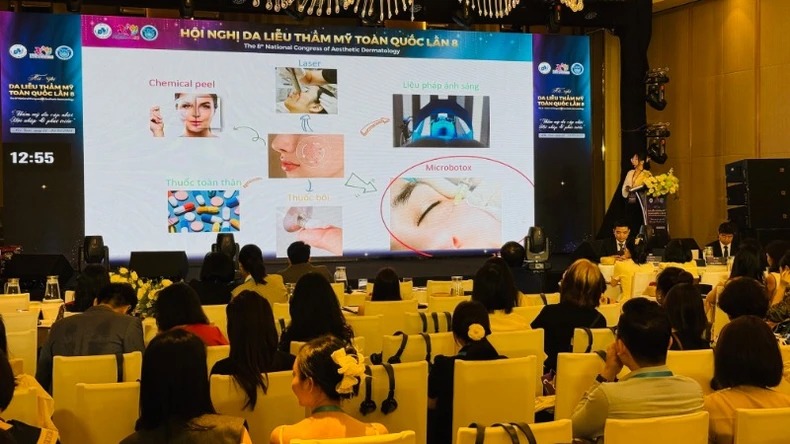 |
| The 8th National Conference on Cosmetic Dermatology updated many new studies and techniques in the field of cosmetic dermatology. |
The Central Dermatology Hospital always focuses on scientific research and organizes conferences, seminars, and training courses to improve the professional capacity of cosmetic dermatologists nationwide.
The conference is an academic forum for experts to exchange knowledge, share experiences and update the latest information in the field of cosmetic dermatology. Thereby, contributing to improving treatment effectiveness, ensuring safety for patients and customers, and helping them access advanced medical advances.
Leading experts say that dermatology today not only focuses on treating common skin diseases, but also expands to areas such as epidemiology, community dermatology, skin immunology, cosmetic dermatology, especially the application of high technology in diagnosis and treatment.
Organizing this conference is not only an opportunity to announce research results and effective treatment models, but also a place to connect knowledge, promote scientific cooperation, and form strategic directions for the dermatology industry in the context of regional and international integration. This is also a premise for developing practical cooperation programs, bringing the Vietnamese dermatology industry to the regional and world level.
Regarding the recent situation where authorities have continuously discovered and destroyed low-quality sunscreens, experts recommend that people carefully research the product's origin, provenance and safety of skin care and beauty products.
Consumers should not buy products based solely on advertising, because using cosmetics of unknown origin can cause many serious skin problems such as allergic contact dermatitis, irritant dermatitis, and may even contain unsafe medicinal ingredients.
Improving the quality of cancer care at medical facilities
K Hospital (Ministry of Health) organized the 2nd National Cancer Nursing Conference with the theme "Improving the quality of cancer patient care: From theory to practice". The conference attracted nearly 1,000 delegates including leaders of the Ministry of Health, Vietnam Nursing Association, leaders of K Hospital, domestic and international experts and scientists from Japan, Indonesia, Singapore, countries with developed medicine in the field of cancer care.
Speaking at the conference, Prof. Dr. Le Van Quang, Director of K Hospital, emphasized that cancer is still one of the biggest challenges facing the global medical industry. In that context, nurses play an increasingly important role, not only as the force performing specialized techniques but also as the ones who directly accompany patients throughout the treatment process.
Nursing not only requires solid professional knowledge, but also sensitivity, compassion, the ability to provide psychological support, control pain, manage side effects and contribute to facilitating the recovery process of patients. The World Health Organization (WHO) has also affirmed that nursing care is one of the strong pillars of the health system.
On the occasion of International Nurses Day (May 12), the International Council of Nurses (ICN) issued a message of action with the theme “Our nurses. Our future”, affirming that caring for the health and working conditions of the nursing staff is also an investment in the future of the health system and the economy.
ICN emphasizes a series of essential activities such as: ensuring remuneration commensurate with the contributions of nurses, protecting occupational safety for nurses in hazardous working environments, investing in training, upgrading equipment, improving career development policies and enhancing the position of nursing in society.
At the workshop, Dr. Duong Huy Luong, Deputy Director of the Department of Medical Examination and Treatment Management (Ministry of Health), highly appreciated the role of the oncology nursing team in areas such as policy development, care management organization, training, practice and scientific research. However, he also pointed out that in many medical facilities, nursing is still not properly recognized, when the concept that "nursing is a service profession, only following doctors' orders" is still popular.
The current situation shows that nursing human resources are lacking in both quantity and quality. The professional level of nurses is still low compared to many countries in the region. In many places, patient care still depends heavily on the patient's family, the practice of nurses is not commensurate with the level of training, while the nursing leadership and management system also has many shortcomings.
To overcome this situation, Dr. Duong Huy Luong suggested that the health sector and medical examination and treatment facilities need to continue to invest more heavily in nursing, raising awareness of the role of nursing in the modern health system. Along with that is the development of high-quality nursing human resources, promoting the application of technology, upgrading equipment, aiming for a comprehensive patient care model, suitable for practical requirements and international integration. This is also an important foundation to achieve the goals of sustainable development, universal health insurance and universal health care.
Within the framework of the workshop, domestic and foreign experts discussed and shared many practical contents to improve nursing capacity in the management and care of cancer patients, including palliative care, care in radiotherapy, diagnostic imaging, and new techniques in specialized nursing practice.
The workshop is an important opportunity to review the efforts, achievements and challenges in cancer nursing in Vietnam, and at the same time open up new directions of development to improve the quality of patient care at medical facilities across the country.
Super robot successfully assisted surgery on complex kidney tumor
Doctors at Tam Anh General Hospital in Ho Chi Minh City have just successfully performed a complicated surgery to remove a right kidney tumor using the most modern Da Vinci Xi robotic system in Southeast Asia, on a special patient whose entire intestine was abnormally located on the liver, and who had undergone multiple surgeries causing complex abdominal adhesions. The surgery was not only successful but also helped the patient recover quickly, minimize pain, and discharge after a few days.
The patient is Mr. D.Q.Tr., 75 years old, from Hau Giang, who was found to have a tumor in his right kidney during a routine health check-up. He had many underlying diseases such as diabetes, high blood pressure, fatty liver, and obesity, making the surgery more risky. In particular, he had an intestinal malrotation, with the entire intestine lying above the liver instead of below as in the normal anatomical structure, hindering access to the kidney.
Associate Professor, Dr. Vu Le Chuyen, Director of the Center for Urology - Nephrology - Andrology, Tam Anh General Hospital, Ho Chi Minh City, said: "In this case, if using traditional surgical methods or old-generation robots, it is very difficult to ensure safety. The tumor is located close to the renal vein, an area with a high risk of bleeding, increasing the complexity."
After consulting with specialists, the team decided to use the Da Vinci Xi robot, the latest generation available in Southeast Asia, combined with a Hybrid operating room integrated with real-time imaging. This allows for access to the tumor from behind (retroperitoneum), a highly technical but less traumatic method, helping to preserve maximum kidney function.
With 4 flexible arms that rotate 540 degrees, a high-resolution 3D camera that magnifies images up to 15 times, the Da Vinci Xi robot allows doctors to operate precisely in narrow spaces, minimizing invasion, less bleeding, and small incisions only the size of a fingertip. In particular, the integrated tools can cut and weld blood vessels immediately, helping to control bleeding much more effectively than manual suturing.
Dr. Phan Huynh Tien Dat, a member of the surgical team, said: “If we use open surgery or conventional endoscopic surgery, the risk of bleeding is very high, especially when the tumor is close to a large blood vessel. With the Da Vinci Xi robot, we can operate flexibly, automatically cut, compress, and weld blood vessels without the need for manual suturing, making the surgery safer and faster.”
The surgery began with Associate Professor, Dr. Vu Le Chuyen choosing an approach through the back to create a retroperitoneal space. The robotic system automatically aligned and suggested appropriate robotic arm placement, helping to minimize the risk of injury. 4 trocars were inserted in an optimal straight line for Asian body shape. Surgical instruments were precisely controlled via a touch interface, combined with voice instructions.
After only 1 hour, the surgery was completed without complications. The patient was awake a few hours after surgery, could sit up, talk to relatives the next day, the incision was small, less painful, did not require special care and was discharged after only a few days.
According to Associate Professor, Doctor Vu Le Chuyen, robotic surgery is a major breakthrough in surgery, especially in hard-to-reach areas such as the deep abdomen, close to large blood vessels, and the pelvic area. Robots help improve accuracy, reduce trauma, shorten surgery time, speed recovery, and reduce the risk of complications.
In the field of Urology - Nephrology, the Da Vinci Xi robot is highly effective in surgeries such as: partial and total nephrectomy, prostatectomy, bladder reconstruction, ureteral reconstruction, etc. Especially in cancer cases such as kidney, prostate or bladder cancer, the robot helps surgeons operate with almost absolute precision in complex anatomical locations.
Source: https://baodautu.vn/tin-moi-y-te-ngay-245-ung-dung-cong-nghe-moi-trong-chuyen-nganh-da-lieu-tham-my-d289132.html


![[Photo] Journalists moved to tears at the Memorial Service for the soldiers who died in Gac Ma](https://vphoto.vietnam.vn/thumb/1200x675/vietnam/resource/IMAGE/2025/5/30/9454613a55c54c16bf8c0efa51883456)
![[Photo] General Secretary To Lam receives Chief of the Central Office of the Lao People's Revolutionary Party](https://vphoto.vietnam.vn/thumb/1200x675/vietnam/resource/IMAGE/2025/5/30/140435f4b39d4599a3d17975dfb444c5)

![[Photo] A delegation of 100 journalists from the Vietnam Journalists Association visits the soldiers and people of Truong Sa island district.](https://vphoto.vietnam.vn/thumb/1200x675/vietnam/resource/IMAGE/2025/5/30/0984a986227d4e988177f560d2e1563e)
![[Photo] National Conference "100 years of Vietnamese Revolutionary Press accompanying the glorious cause of the Party and the nation"](https://vphoto.vietnam.vn/thumb/1200x675/vietnam/resource/IMAGE/2025/5/30/1cf6cd5c8a934ebfa347028dcb08358c)






![[Video] Vietnam strives to master the technology to produce 15 types of vaccines by 2030](https://vphoto.vietnam.vn/thumb/402x226/vietnam/resource/IMAGE/2025/5/30/9b660538f5aa46daaff8b19dc9ca8204)
































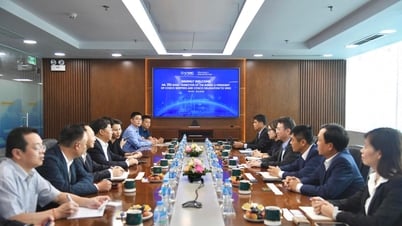

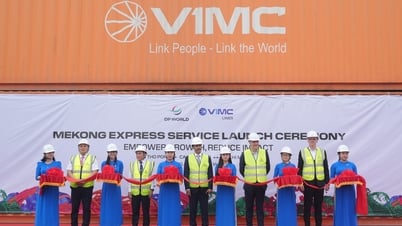












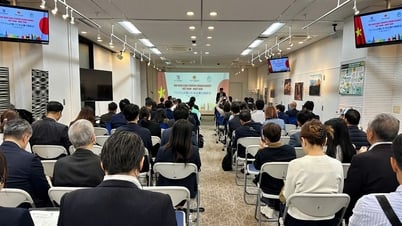






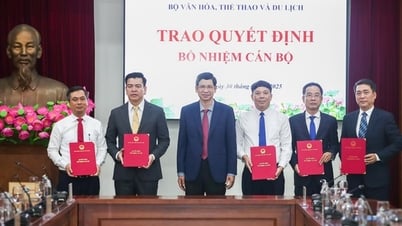























Comment (0)